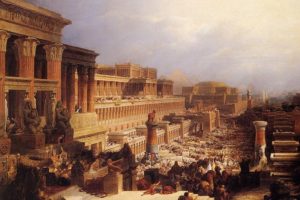“O LORD our Lord, how majestic is your name in all the earth. You have set your glory above the heavens. From the lips of children and infants you have ordained praise because of your enemies, to silence the foe and the avenger.” (8:1-2)
Recently I’ve been participating in a Hebrew reading group and we are presently working through the Psalms. I just began translating Psalm 8, an all-time favorite. From the opening, the reciter of this Psalm is drawn immediately into unabashed approbation. The same acclamation of verse 1, “O LORD, our Lord, how majestic is your name in all the earth!” closes the Psalm, reaffirming this central message.
The first thing we notice in this Psalm is that David is praising the name of God. You might find it interesting, as I did, that David is not directly highlighting the majesty of God Himself, but rather the Lord’s name is called majestic. In our culture, where most people name their children because they like the sound of it, this may not seem important. But to Hebrew culture, one’s name was very significant and expressed purpose. Hannah named her son Samuel because she asked him of the Lord (1 Sam. 1:20). Being old in age, Abraham and Sarah named their son Isaac which means laughter, because, as Sarah said: “God has made laughter for me; everyone who hears will laugh with me” (Gen. 21:6)
One’s name is often synonymous for one’s reputation. Those building the tower of babel did so to: “Make a name for themselves.” (Gen. 11:4). Throughout Scripture, the same Hebrew word here translated for name is translated for men of renown, as in the case of the chosen elders of Israel in Num. 16:2.
When we speak of the Lord’s name, there is particular importance because it is his personal disclosure and reveals His relationship with His people. His name reveals many things about Himself: His power, authority, and holiness. Israel had great reverence for God’s name, as was commanded of them (Ex. 20:7)
At first glance, this first verse appears repetitive, O LORD, our Lord. However, in Hebrew, we have two names expressed here. The first, YHVH, became the proper name of the God of Israel which was first disclosed in Ex. 3:14 when God tells Moses: “I AM WHO I AM.” The root idea is that of uncreated existence. When it is said that God’s name is “I am,” it is not just affirming simple being. The Lord is in a sense in which no other being is. He is, and the cause of His being is in Himself. Yahweh is the self-existent one; He has no source. This truth evokes awe in His power and majesty.
Secondly, we see the Lord referred to as Adonai which denotes ownership, and absolute sovereignty as master, owner and Lord. This title is not solely used as a divine name, as is the case with YHVH. It is sometimes used to describe the role of master within human relationships. Where it is applied to God, it reveals Him as the owner and ruler of the whole earth (Ps. 114:7).
In praise, David proclaims the majesty of the Lord’s name. Many lofty images often come to mind when we speak of something majestic – the grandeur of majestic mountains or the wonder of the skies above (v.2). The main idea is something impressive, something with power.
Verse two serves as an illustration of the majesty of God’s name. It would be phenomenal to hear an infant speak. But God often uses the weak things to bring glory to himself. When the chief priests and the scribes criticized Jesus for accepting the praise of the children who cried out “Hosanna to the Son of David,” he silenced them by quoting Ps. 8:2: “Out of the mouth of children and infants you have ordained praise” (Matt 21:16).
As we start a new week, may we be drawn into deep approbation as expressed in Psalm 8. May we remember his renown throughout history. May we remember that He is the self-existent one and the sovereign ruler over all the earth. May we be conscious of His lordship in our own lives and be strengthened in continuous praise of His name!





Leave a Reply
Your email is safe with us.